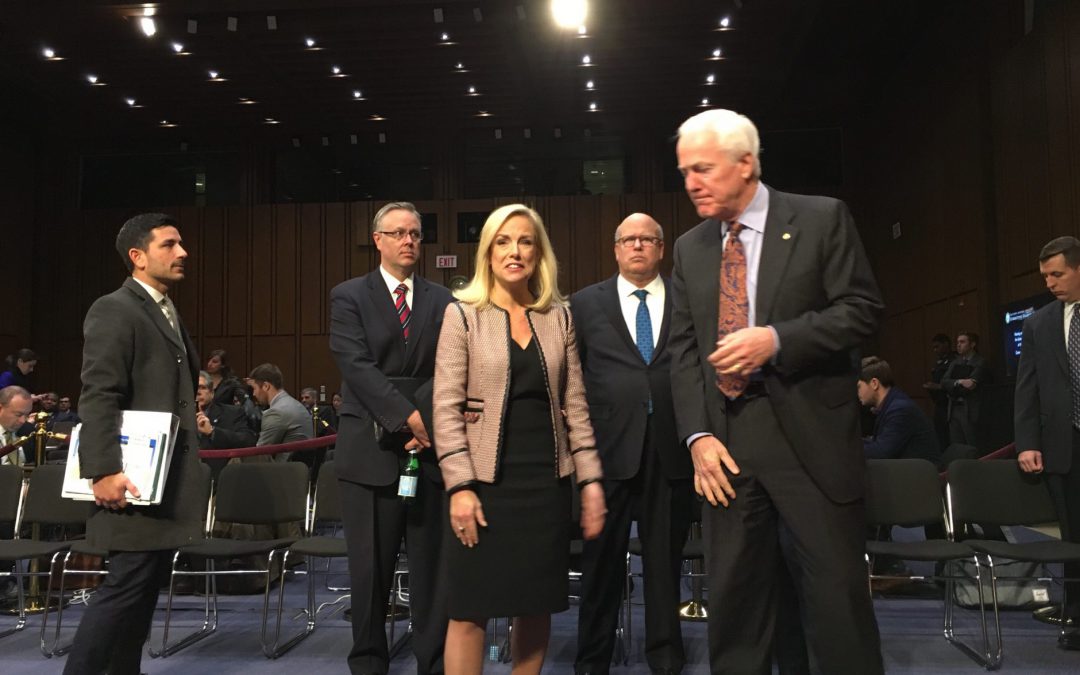WASHINGTON — Homeland Security Secretary Kirstjen Nielsen said that she did not hear President Donald Trump call Haiti and African countries “shithole” or “shithouse” nations during a White House meeting last Thursday on an immigration deal.
Testifying before the Senate Judiciary Committee, Nielsen did acknowledge that “anything is possible,” when the idea was raised that she might not have heard the specific conversation in question.
“Many people in the room were using inappropriate language in the Oval Office in front of the president, that’s what struck me,” Nielsen said.
Nielsen’s account of the meeting contradicted statements made by the committee’s own Sen. Lindsey Graham, R-S.C., and Richard Durbin, D-Ill.
For most of the hearing and in statements made over the weekend, Nielsen claimed that she “did not recall” the specific exchange in the Thursday White House meeting. This deflection prompted an impassioned response at Tuesday’s hearing from Sen. Cory Booker, D-N.J., who used the majority of his 10 minutes of question time to decry what he called the implicit racism of both the comments Trump allegedly made and Nielsen’s hesitancy to make a direct claim regarding the truth of the assertions.
“When the commander-in-chief speaks, I listen,” Booker said. “Your silence and amnesia is complicity.”
After Booker’s emotional speech drawing a parallel between the rhetoric of the president and violence perpetrated by white supremacists, Nielsen emphasized the position of the DHS as aligned against any and all violence, including that of white supremacists.
This was a point of contention in the hearing because Nielsen made no mention of terrorism committed by white supremacists in her opening statements when she announced the release of a report detailing international terrorism offenses carried out by foreign nationals. The report was required by the travel ban executive order in March.
Though the hearing was dominated by the “shithole” debate, the committee touched on nearly every issue that has been dominating recent headlines, ranging from Trump’s proposed wall between Mexico and the U.S. and renewal of the Deferred Action for Childhood Arrivals or a compromise to allow so-called “dreamers” to stay in the U.S. to Special Counsel Robert Mueller’s investigation and the false alarm in Hawaii that caused residents to believe they were about to be struck by a ballistic missile for 38 minutes.
Committee Chairman Charles Grassley, R-Iowa, opened the hearing by declaring a need for a “fair and equitable solution” to the DACA problem. The inability by Congress to reach a deal over the temporary protected status of certain undocumented immigrants is a major contributing factor to Congress’ inability to pass a budget bill ahead of Friday’s shutdown deadline.
“There are loopholes that prevent us in various cases from removing somebody, from what we would all generally consider to be a serious crime,” Nielsen said. Nielsen stressed the importance of closing these loopholes and moving immigration towards a merit-based system, after accounting for those who are currently protected under DACA.
On the subject of the wall, Sen. Patrick Leahy, D-Vt., pressed Nielsen about any possible arrangements made with Mexico to fund the wall. Nielsen claimed that she did not know what Leahy meant by “arrangements,” mirroring President Trump’s walk back of previous assertions that the wall would be fully funded by the Mexican government.
“Usually when something you pay for it with money,” Leahy said.
Nielsen said she was not aware of any such “arrangement,” but she was adamant that “walls work.”


